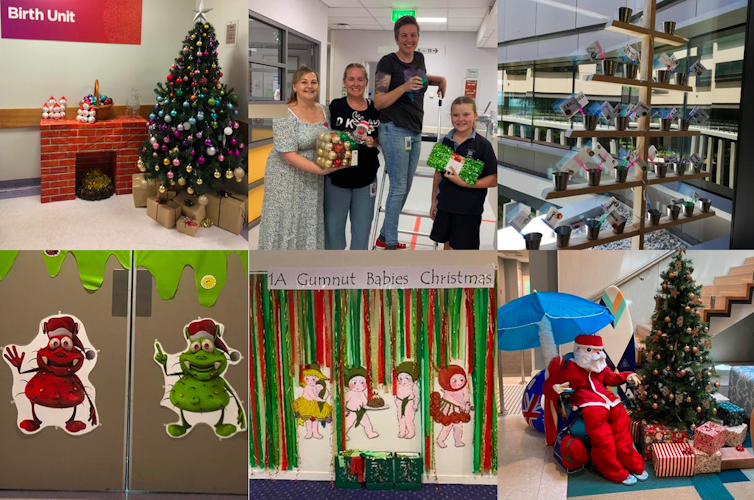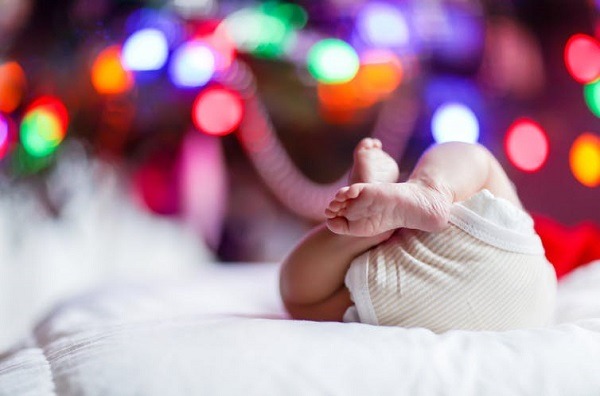This is what you can expect if you’re on the maternity ward this Christmas season, writes Hannah Dahlen, Western Sydney University in this piece republished from The Conversation.
Having a baby at Christmas can be both a joyous time and a cause for anxiety. This Christmas, with a pandemic sweeping the world, there may also be some unique considerations on parents’ minds.
So if you’re one of the women on the maternity ward around Christmas time, you might want to know what to expect.
Can your partner be with you when the time comes? Will there be tinsel? What if you don’t celebrate Christmas?
What are the chances of a Christmas baby?
In Australia, December 25 is actually the least likely day of the year to be born, closely followed by December 26. So finding room at the inn to give birth in 2020 shouldn’t be a problem.
We also see a similar pattern in other countries that celebrate Christmas. The main reason is some women (and some staff) want to avoid births on that day, so they are more likely to schedule births early.
But this year may be different. Christmas is around 40 weeks after Australia’s nationwide COVID lockdown in March and April. So, we’ll soon see if we end up delivering more “lockdown babies”.
But what is it actually like?
In some ways, Christmas on a maternity ward is pretty much like any workplace with staff rostered on for December 25. There’s lots of good (read: sugary) food, funny hats and festive bling. But of course, the prospect of helping “catch” (midwife term for deliver) a Christmas baby makes it much more special.
If you ask any midwife what it’s like to “catch a baby” or care for new parents on Christmas Day, they break into a smile and have a lovely story. I recently asked for some anecdotes, and my inbox was soon filled with heartwarming snippets, along with photos of Christmas decorations festooning the maternity units.
One midwife told me:
I was dressed in a very festive, fully sequinned Christmas shirt and I responded to a call bell over in the birthing unit, as everyone was busy. A lovely mother was in the bathroom giving birth. I caught her baby and suggested she now move over to the bed to birth the placenta, when she looked me in the eye and asked if we should call a midwife. She thought I was a visitor.
Another midwife recalled:
Late in the evening on Christmas Eve, a small group of nuns came to the birthing unit to enquire if there was likely to be a birth soon. I advised them (with consent from the woman I was looking after) that the woman was likely to birth just after midnight. Each nun nodded to one another and smiled at me, as they thanked me for this insight. Then, when it came time for the baby to be born, the couple and I heard the most beautiful choir of angels outside the birthing room, singing Away in a Manger quietly. It was heavenly, so beautiful. We all cried tears of happiness and joy together.
Will this Christmas be different?
In Australia we are lucky COVID case numbers are down, and the strictest health measures have been lifted. Some hospitals still have limits on the number of support people who can be present at the birth, and how many visitors you can have afterwards. It’s best to check your maternity unit’s specific arrangements.
Staff will make great efforts to make this a time of celebration. Women often go home early when giving birth at Christmas, and this is not just due to COVID. Women told me of being discharged home just in time for Christmas lunch to be with their families and being waited on hand and foot. If this is what’s in store for you, be sure to rest. And no cooking Christmas lunch!
Will there be tinsel in birth units this year?
Many midwives love to decorate the maternity units they work in, although COVID requirements have made it trickier this year. One midwife told me how beautifully her team “decorated the wards on a Sunday when the managers were not about and on Monday were promptly told to take [the decorations] down due to COVID”.
Nevertheless, I received many pictures of innovative (and easily wiped down) COVID-safe decorations.

It is also important to remember many cultures and countries do not celebrate Christmas. But you don’t have to observe Christmas to enjoy a little respite at the end of a tough year.
But what happens every year after giving birth to a Christmas Day baby? One mother told me the worst thing is the “sympathy all the time. We make it his own special day in his own special way”. Another told me her daughter loves having her birthday at Christmas and just pretends the whole world has “turned the celebrations on for her”. Other mums say they have a smaller celebration on the actual day and another one further away from Christmas.
Christmas can also be a vulnerable time
Christmas can also be a time of vulnerability for women, children and families. Close family may live far away, or there may be a lack of support in a woman’s life. Family, domestic and sexual violence can increase.
Alcohol, which flows freely during this time, can add to the danger. Pregnant women are more vulnerable to domestic violence anyway and this escalates at Christmas time.
Women experiencing difficulty breastfeeding may also feel they have little support over the holiday period.
For parents who have lost a baby this year, either through miscarriage, stillbirth or neonatal death, Christmas, which is all about celebration and family, can add to the grief.
And 2020 has been a particularly tough year for many of us. Our mental health has been tested and exhaustion may have set in. Some people have lost friends or family members, or lost their job. Women in particular have shouldered much of the burden of home-schooling and caring for the family.
Whatever this year has held for you, go gently, and remember you are not alone. Christmas time, on maternity wards and everywhere else, is a celebration of new life and new hope.
If this article has raised issues for you or someone you know, contact: Lifeline – 13 11 14 or text 0477 13 11 14; Beyond Blue – 1300 224 636; National Sexual Violence, Domestic Family Violence Counselling Service – 1800 737 732; SANDS miscarriage, stillbirth and newborn death support – 1300 072 637; Australian Breastfeeding Association helpline – 1800 686 268, download the mum2mum app for ongoing support, or hire a breast pump.
Hannah Dahlen, Professor of Midwifery, Associate Dean Research and HDR, Midwifery Discipline Leader, Western Sydney University
This article is republished from The Conversation under a Creative Commons license. Read the original article.


